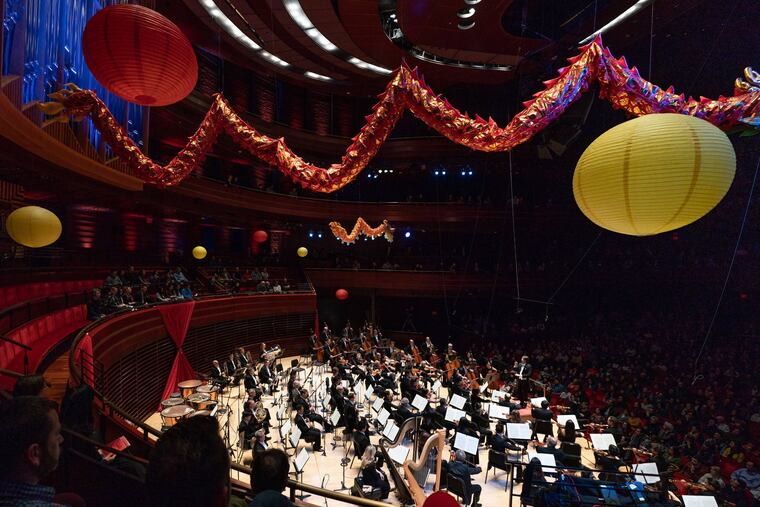Like the Sixers, the Philadelphia Orchestra has a Chinese engagement this week, and two concerts in Taiwan coming soon
A concert Saturday at the Kimmel Center celebrates Chinese culture, as well as the 70th anniversary of the People's Republic of China.

In the long arc of the Philadelphia Orchestra’s relationship with China, Saturday night’s concert and an upcoming visit to China might be seen as routine.
But these are not routine times, and the orchestra’s “China Night” at the Kimmel Center comes as tensions continue to mount between China and the United States.
Talks over trade have strained relations between the world’s two largest economies. Mass demonstrations in Hong Kong have been widely applauded in the West as a democratic exercise in standing up to a repressive government, but China has quickly slapped down any outside gestures it perceives as critical of its policies or leadership.
When Houston Rockets general manager Daryl Morey recently tweeted “Fight for Freedom. Stand with Hong Kong,” Chinese state television canceled broadcasts of NBA preseason games. A 76ers game against the Guangzhou Loong-Lions went on as planned at the Wells Fargo Center this week, although one local fan said he was removed from the arena after holding up signs and shouting support for Hong Kong pro-democracy demonstrators.
Beyond that, with its hostility toward free speech, use of detention camps for religious minorities, and deployment of widespread electronic surveillance, China is now viewed by some as “the largest, most powerful, and arguably most brutal totalitarian state in the world,” as New York Times columnist Farhad Manjoo recently called it.
Meanwhile, the orchestra has increasingly tacked a course toward being a champion of social justice causes and commissioning works with social justice themes.
Have the events of the last few weeks and months shifted anything in the orchestra’s stance toward future tours to China and its singular deep relationship with the country, which began during China’s brutal Cultural Revolution and weathered even Tiananmen Square?
“Yes,” says orchestra president and CEO Matías Tarnopolsky. “We think it’s ever more important now to make sure that there is through music the opportunity for people-to-people exchange.”
Saturday’s concert features Chinese music not often heard on Western stages, as well as The Chairman Dances, the popular orchestral foxtrot from the John Adams opera Nixon in China. Chinese American composer/conductor Tan Dun conducts these works, plus his own Triple Concerto, adapted from his Academy Award-winning score to the Ang Lee film Crouching Tiger, Hidden Dragon.
But the event also specifically celebrates the Chinese government. The concert is in collaboration with the China Philharmonic Orchestra, and printed programs and other materials carry a line stating that it is among the events designed to mark the 70th anniversary of the People’s Republic of China.
The concert arrives on the eve of the orchestra’s Far East tour, which starts in Taipei, Taiwan, on Oct. 31 and continues on to Japan and South Korea through Nov. 10. Music director Yannick Nézet-Séguin conducts.
The orchestra’s history with China dates from 1973, after President Richard Nixon worked with music director Eugene Ormandy to arrange the ensemble’s visit to the PRC, retired American diplomat Nicholas Platt reminds listeners in program notes for the concert. “While many Western orchestras now perform in China, no other musical organization is delivering this depth of, and breadth of, programming, and none has a longer relationship with the PRC,” Platt wrote.
The Far East tour does not include any full-orchestra concerts in China, though a small group of musicians will split off for educational activities in Shanghai and Beijing.
But if figures from the sports and entertainment sectors now feel a responsibility to speak up about China’s stance on censorship and other matters, should the orchestra weigh in with opinions, too?
Not if it values its ties with China.
“In this particularly sensitive 70th anniversary year of the founding of the PRC, of course the orchestra would put its relationship with China at risk should it do anything that China perceived as critical,” says Cathy Barbash, who has consulted with the orchestra on China matters and whose firm regularly deals with China on cultural exchange programs.
Engagement is preferable to isolation, she says.
“By committing to relationships focused on cultural exchange we preserve the ‘safe spaces’ for dialogue to occur when all other avenues are blocked, so pursuing this relationship is looking at the bigger picture,” says Barbash.
The orchestra has relationships “forged over almost 50 years with the people of China in concert halls, educational institutions, and in civic settings that are deeply important to us, and we want to continue to develop and nurture those relationships for decades to come both in China and in the United States of America,” said Tarnopolsky. “Therefore, we are solely going to operate in a cultural and musical sphere.…
“We don’t take any political positions,” he said, reaffirming the stance the orchestra took when its 2018 tour to Israel drew criticism from pro-Palestinian protesters.
“We’re not taking any political positions here. We don’t take any political positions at home,” said Tarnopolsky. “But what is absolutely crucial to us is that the music of the Philadelphia Orchestra is heard in China for generations to come.”
The Philadelphia Orchestra’s “China Night” begins at 8 p.m. Saturday in the Kimmel Center’s Verizon Hall, Broad and Spruce Streets. Tickets are $55. philorch.org, 215-893-1999.